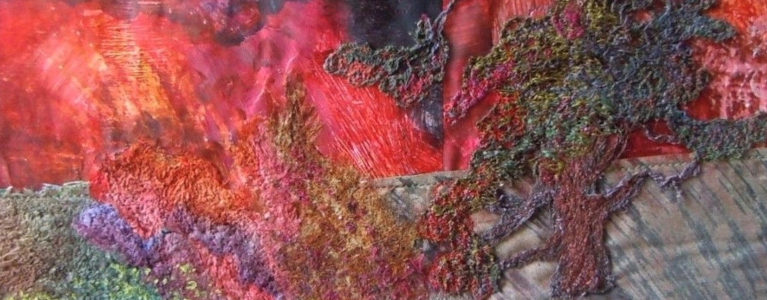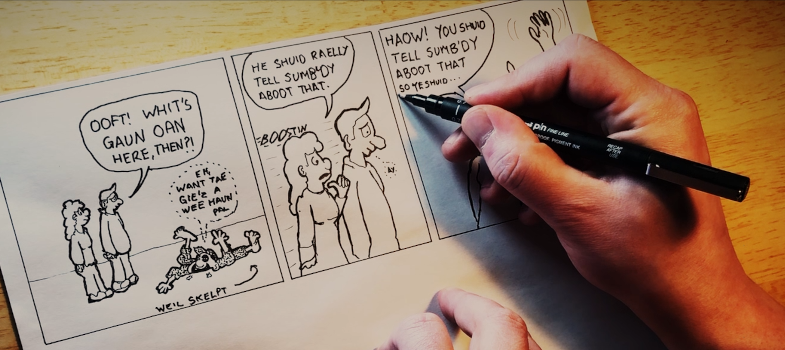Scots Language, Creativity and the Expressive Arts

© Gerda Stevenson
5. Community link 1
Stevenson has been involved in several local community initiatives which have involved the Scots language. Here she will outline two of them, both of which include a new text for you to engage with.
Pentland Writers' Group - co-writing a play on WWII
Some years ago I was a member of a local group, the Pentland Writers’ Group - see Directing: Pentlands at War. Money was made available via the National Lottery for communities throughout the UK to commemorate the 60th anniversary of the end of the 2nd World War. Our writers’ group decided to apply to this fund to put on a large-scale community drama, involving local people. The five writers, of which I was one, interviewed local residents (all aged 70 and over), about their memories of the war. We then wrote a play based on these memories, incorporating several interweaving stories. I edited the script, and directed the play, with a cast of 34 local amateur actors, ranging from 7-70 years of age. We had a live jazz band made up of local musicians, and employed a professional production team – lighting, choreography, musical direction and costume.
I interviewed a joiner, a Scots speaker, and then wrote a series of scenes based on a story he gave me about a local girl and two Italian POWs who were staying and working at Robinsland Farm. As part of this storyline, I wrote a skipping rhyme, performed by the children in the cast. Carlops Village Hall, our venue for the play, is simply a long rectangular space, without a stage. As director, I opted for our playing area to be in traverse – i.e. with the audience divided into two, seated on either long side of the rectangle. This meant that the drama would happen effectively amid the audience. The length of the playing area enabled the children to caw a long skipping rope. They chanted the rhyme chorally, while taking it in turns to jump into the centre of the rope and skip, two others cawing the rope at either end of the space, as I myself remember doing in the school playground as a child. I wanted the children to have fun at this point in the play, so I used a lot of word-play between Scots and Italian. The adults joined in the chanting on the last stanza, which turns darker:
Wartime Skipping Rhyme
Cellani and Lenati,
the braw Italianati,
P.O.Ws
doon in Robinsland Farm.
Cellani and Lenati,
nae mair spaghatti,
they miss their Tally grub
doon in Robinsland Farm.
Cellani and Lenati
diggin the potati,
they're fryin up chips
doon in Robinsland Farm.
Cellani and Lenati
say we're daft as a banani,
they're great for a laugh
doon in Robinsland Farm.
Cellani and Lenati
dinnae drive a Bugatti
but they gie tractor rides
doon in Robinsland Farm.
Cellani and Lenati
brew rosehip Frascati,
we're gonnae hae a party
doon in Robinsland Farm!
Cellani and Lenati
Cellani and Lenati
Braw Italianati,
Braw Italianati
Lenati's in la notte
speakin sotto voce
Mary's in her nightie
in the braw moonlightie
Lenati and his lassie
doon in Robinsland Farm.
Mary and Lenati,
bye-bye ma bonnie birdie,
Mary and Lenati,
so long, arrivederci,
Mary and Lenati,
tristi, tristi,
Mary, lassie, Mary,
forget aboot Lenati,
Mary, lassie, Mary,
mind on Mussolini,
ye cannae love Fascisti
cut yer losses, lassie -
leave.
You can hear me reading WarTime Skipping Rhyme on my Soundcloud.
You can read about the production process and performance of Pentlands at War on the following link: Directing: Pentlands at War
